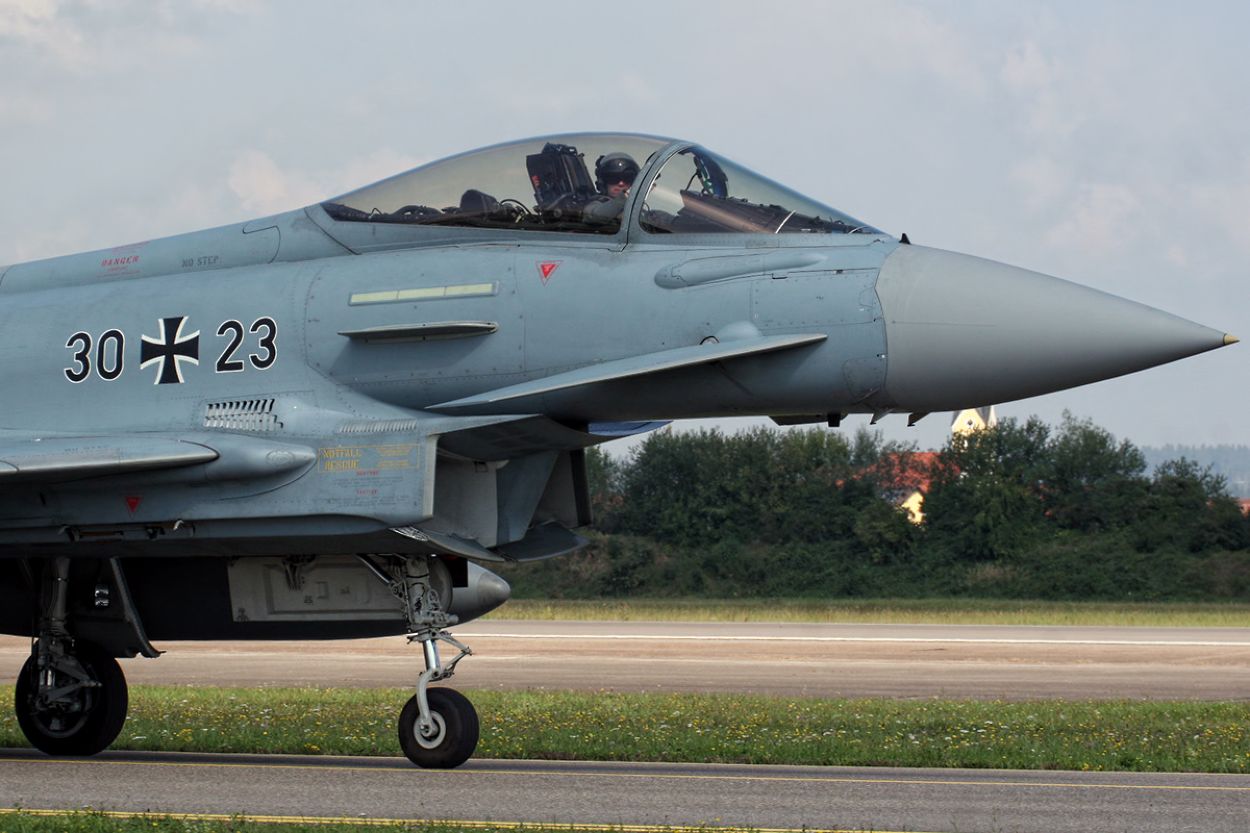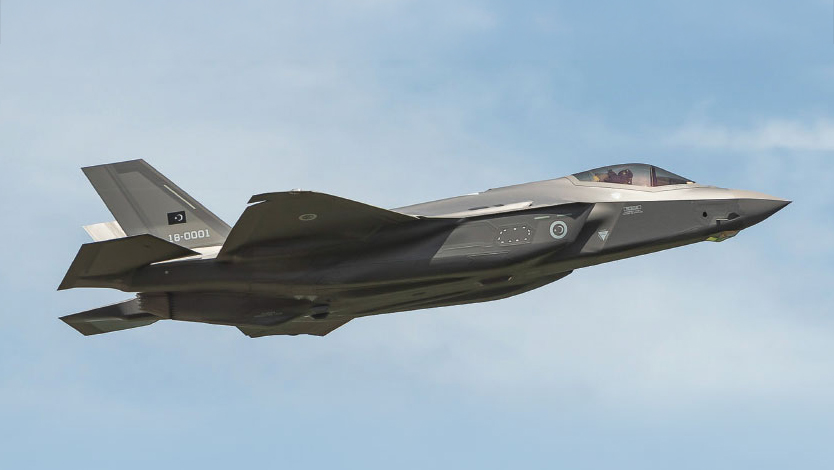After struggling to augment its air power for years, Turkey could be inching closer to assembling one of the most powerful air forces in the Middle East, comprising the European Eurofighter Typhoons, American F-16 and F-35 stealth fighters, the indigenous KAAN, and a fleet of cutting-edge combat drones.
A crucial link to achieving this dream lies through Germany, which has been hesitant in approving the sale of the forty 4.5th-generation Typhoons requested by Turkey, due to reservations about Ankara’s human rights record.
The Eurofighter Typhoon is built by a consortium comprising Germany, Britain, Italy, and Spain, and all members must give their consent for a purchase to proceed. The UK has long been eager to sell the aircraft to prospective buyers (including Turkey) to keep the production lines running, fully supported by Italy and Spain.
Turkey has been relentlessly lobbying the German administration for a green light, and it appears to be finally paying off, as hinted by German Chancellor Friedrich Merz on July 17 during a joint news conference with British Prime Minister Keir Starmer in London, where the two leaders signed the “friendship treaty.”
Merz said that the two sides have made progress in the potential sale of jointly produced military equipment.
When probed on whether the newly signed treaty would facilitate the export of jointly produced systems, such as Eurofighter jets, and if Berlin would approve the potential sale to Turkey, Merz said there was progress, without directly mentioning Ankara’s case.
“We also discussed the issue of export licenses. There hasn’t been a final decision yet, but we’re on the way to a good decision that could also make a corresponding export license possible, Merz told the reporters, adding, “As to which specific countries this will apply to, you’ll have to forgive me, but I cannot say that at this moment.”
Meanwhile, the British contractor BAE Systems exuded optimism, with Richard Hamilton, managing director for Europe and International in BAE Systems’ Air sector, stating that there was potential for new orders of up to 150 new Typhoons.
“The confidence it gives the export partner, you know, with the Saudis, with the Turkish, when they see that this thing has a life, it just makes the whole conversation so much easier,” Hamilton told reporters.

While Germany has remained steadfast for a long time, especially under the Olaf Scholz administration, a sale seems to be on the horizon under the leadership of Merz, as also indicated by reports in local German publications.
The acquisition of these cutting-edge fighters would significantly bolster the combat capability of the Turkish Air Force, which is currently composed of aging F-16 C/D procured from the United States.
Turkey has been eager to sign fighter jet contracts in response to Greece’s procurement of Rafale jets and the impending acquisition of F-35 stealth fighters, as previously reported by EurAsian Times.
Assembling A Powerful Air Force
In addition to the Eurofighter Typhoon, Turkey has its sights on the American F-35 Joint Strike Fighter, which has also remained out of bounds for the country’s aging air force.
Turkey was previously a partner in the F-35 consortium, with plans to buy 100 Lockheed Martin F-35A Lightning II aircraft. However, in an unprecedented turn of events, it was banished from the program in 2019 for pressing ahead with the purchase of the Russian S-400 air defense system, despite fierce opposition from the United States.
Turkey was sanctioned by the US, a NATO ally, under the Countering America’s Adversaries Through Sanctions Act (CAATSA). However, it never gave up on the F-35, and six years after this debacle, Turkey is now resetting ties with the United States and lobbying to secure the coveted fifth-generation stealth aircraft from Washington.
Late last month, Turkish President Recep Erdoğan stated that his country has not abandoned its pursuit of the F-35 fighter jet and has communicated its intention to rejoin the F-35 consortium.
The comments were reportedly made following one-on-one talks between Erdogan and Trump on the sidelines of the summit. “We have not given up on the F-35s. We are discussing our intention to return to the programme with our counterparts,” he was quoted as saying by his office on June 26. “We discussed the issue in our meeting with Mr Trump, talks at a technical level have started. God willing, we will make progress,” he added.

Meanwhile, the US envoy to Ankara said on June 29th that US sanctions on Turkey’s defense sector are likely to be lifted by the end of the year.
If the murmurs in the Western media are anything to go by, Donald Trump was warming up to the idea of selling the F-35 to Ankara if the two sides could reach a consensus that renders Turkey’s Russian S-400 system inoperable. The report noted that the US could either demand that the S-400 be disassembled or moved to a US base in Turkey.
In addition, Turkey achieved a breakthrough last year when it managed to convince the US to sell 40 F-16 Vipers and 79 modernisation kits for the existing F-16 C/D fighters in the Turkish Air Force.
This was seen as a major victory for Ankara, as it had been working relentlessly since 2021 to obtain authorization from the US, which was finally achieved last year in return for Turkey’s ratification of Sweden’s NATO membership.
Turkey has since scaled back the purchase, refusing to buy the 79 modernisation kits, and announcing that the modernization of the Turkish F-16s would take place locally.
Besides acquiring state-of-the-art American and European jets, Turkey is also gearing up to field its fifth-generation stealth aircraft, the KAAN.
The twin-engine multirole/air superiority fighter, developed by Turkish Aerospace Industries (TAI), made its first flight in February and is expected to enter service in the early 2030s, catapulting Turkey into a small clique of countries that have indigenously developed a fifth-generation fighter.
Turkey is already promoting the aircraft in the international market, with countries such as Pakistan and Indonesia considering the purchase of the aircraft.

Complementing these manned fighters are Turkey’s cutting-edge UAVs. This includes the Bayraktar TB2, which has demonstrated its combat prowess on various battlefields, including Ukraine and the Nagorno-Karabakh War between Azerbaijan and Armenia.
Bayraktar has now produced a new, next-generation variant of the drone, the TB-2T AI, which comes equipped with a turbo engine and advanced artificial intelligence.
The company has also developed the Bayraktar Akinci, a high-altitude, long-endurance drone that can be armed with weapons. The drone is equipped with a variety of air-to-air and air-to-ground missiles. According to Baykar, the drone can perform maneuvers similar to fighter jets and carry a range of payloads.
Additionally, the Akıncı can strike targets on land and in the air. It can also fly higher and stay airborne for longer.

In addition, Turkey has made a significant breakthrough in developing stealthy unmanned aircraft, with two models deserving special mention. One of these is the Anka-3, the first flying-wing, deep-strike drone developed by Turkish Aerospace Industries. The Anka-3 is a medium-altitude, long-endurance unmanned aerial vehicle (UAV) designed for surveillance missions.
The other unmanned aircraft that positions Turkey as a world leader in this area is the Kizilelma, also known as the National Unmanned Combat Aerial Vehicle System (MIUS).
Developed by Baykar, Kizilelma is an unmanned fighter jet designed to carry out a wide range of military operations, including close air support (CAS), missile offensives, suppression of enemy air defenses (SEAD), and destruction of enemy air defenses (DEAD).
It is pertinent to note that this is not an exhaustive list of Turkey’s drones, which are now seeing a surge in popularity globally. It wouldn’t be an exaggeration to state that if the Recep Tayyip Erdogan government can convince the US and Germany to approve the sales, Turkey would have one of the most advanced air forces in the world.
- Contact the author at sakshi.tiwari9555 (at) gmail.com
- Follow EurAsian Times on Google News




